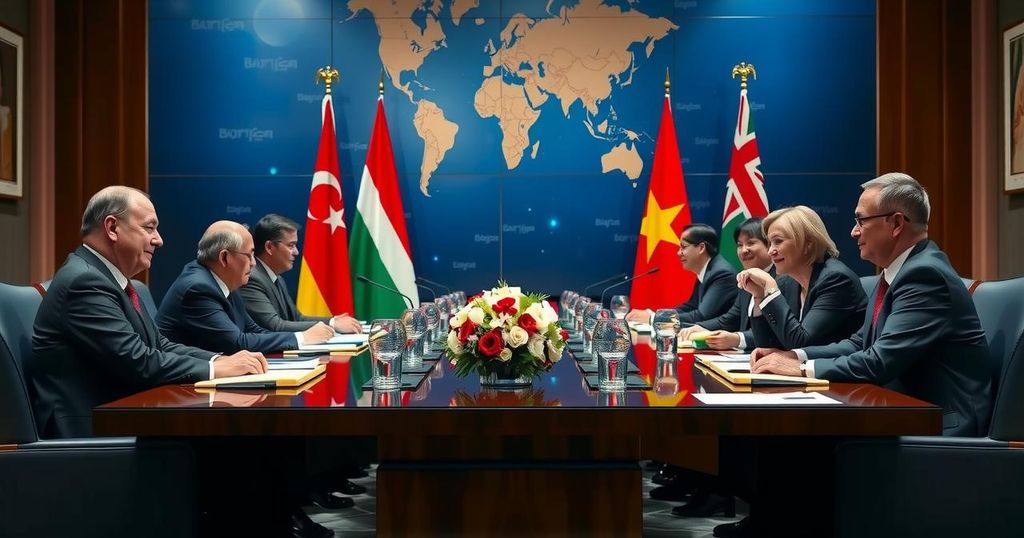Russian President Vladimir Putin is hosting the BRICS Summit, convening over two dozen countries to discuss creating a “new world order” that diminishes U.S. dollar reliance. While the summit symbolizes Russia’s influential global agenda, member states like India and Brazil advocate for diplomatic approaches to reform international institutions and enhance cooperation among emerging markets, aiming to reshape the economic landscape amid ongoing geopolitical tensions.
This week, President Vladimir Putin of Russia convened representatives from over two dozen nations at the BRICS Summit held in Kazan, Russia, to deliberate on establishing a “new world order” that aims to challenge the prevailing Western influence and reduce dependence on the U.S. dollar. This summit represents a significant global stage for Putin following the geopolitical ramifications of Russia’s invasion of Ukraine in 2022. The discussions, taking place from Tuesday to Thursday, focus on decreasing reliance on the dollar to navigate economic sanctions imposed by Western countries. President Putin remarked, “The dollar is being used as a weapon. We really see that this is so. I think that this is a big mistake by those who do this.” During the summit, notable cooperation between China and India was highlighted as their leaders, President Xi Jinping and Prime Minister Narendra Modi, sought to foster a more amicable relationship following years of tension. This meeting comes shortly after an agreement was reached to resolve a prolonged military standoff in the disputed Himalayan region between the two nations. In a show of solidarity, President Putin asserted that “Russia-China cooperation in international affairs is one of the main stabilizing factors in the world.” Meanwhile, India has bolstered Russia’s economy by purchasing oil that has been sanctioned by several other countries, demonstrating the complexities of international alliances. The BRICS group originally comprised Brazil, Russia, India, China, and South Africa, initially framed as an initiative by analysts from Goldman Sachs to identify the rise of emerging markets. Over recent years, this alliance has expanded significantly with countries like Iran, Egypt, Ethiopia, the UAE, and Saudi Arabia joining in January. Turkey, Azerbaijan, and Malaysia have also expressed interest in joining, with Turkey being the first NATO member to seek affiliation. Presently, BRICS nations together account for approximately half of the world’s population and contribute 35% of global economic output. Interestingly, some BRICS members, such as Egypt, benefit from U.S. military aid, while the UAE hosts U.S. military installations. Russian officials consider the three-day summit a resounding success, with 36 countries confirming participation and 24 sending representatives. As part of its strategy, Russia is actively inviting more nations to join a payment system designed as an alternative to the SWIFT network, which has been utilized to impose sanctions on Russian officials. Although Russia advocates for a unified anti-Western stance at the summit, member states like Brazil, India, and South Africa promote a more diplomatic approach, emphasizing that BRICS should reform global institutions to better serve the interests of the Global South, including reassessments of structures like the World Bank and the International Monetary Fund. Iranian President Masoud Pezeshkian remarked that BRICS should evolve beyond merely being a “dialogue club,” criticizing the West for utilizing sanctions as a tool of coercion. He contended, “Over more than three decades since the collapse of the bipolar system, it has become increasingly clear that from the perspective of Western powers, peace, democracy, prosperity, and development can only be achieved through pathways defined by them.” Current data indicates that dollar assets constitute around 59% of global foreign currency reserves, a decline from 70% in 1999. Former President Donald Trump warned that the loss of the dollar’s status as the world’s primary currency would equate to a significant national defeat. He stated, “I was a user of sanctions, but I put them on and take them off as quickly as possible, because ultimately it kills your dollar, and it kills everything the dollar represents.” Overall, while Russia pushes for a decisive shift in the global economic landscape at the BRICS Summit, the complexities and aspirations of its evolving membership reveal challenges in establishing a cohesive alternative to Western dominance.
The BRICS Summit serves as a critical forum for member nations to explore pathways for developing an alternative global order that diminishes Western influence and the reliance on the U.S. dollar. Given the geopolitical tensions since the Russian invasion of Ukraine, this summit has become particularly pertinent for members seeking to forge stronger economic ties, while simultaneously addressing historical grievances and current global economic challenges. The evolving dynamics within BRICS underscore the shifting balance of power as emerging markets seek to redefine their roles on the global stage, balancing cooperation and strategic independence.
In conclusion, the BRICS Summit showcases a collective effort by emerging nations to challenge the existing world order led by Western powers, particularly the United States. With a focus on reducing dependency on the U.S. dollar and fostering mutual cooperation among member states, notable developments such as the rapprochement between China and India signal potential shifts in international relations. However, the pathway towards transforming BRICS into an influential alternative on the global economic stage is fraught with complexities and requires a comprehensive strategy beyond mere declarations of intent.
Original Source: www.foxnews.com






